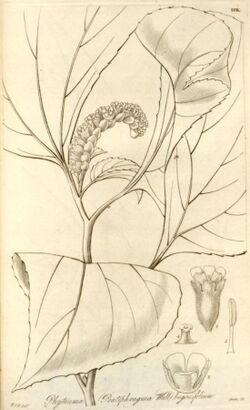Biology:Pentaphragma
| Pentaphragma | |
|---|---|

| |
| Pentaphragma begoniaefolium | |
| Scientific classification | |
| Kingdom: | Plantae |
| Clade: | Tracheophytes |
| Clade: | Angiosperms |
| Clade: | Eudicots |
| Clade: | Asterids |
| Order: | Asterales |
| Family: | Pentaphragmataceae J.Agardh[1] |
| Genus: | Pentaphragma Wall. ex G.Don |
| Species | |
|
See text | |
| Synonyms[2] | |
|
Francfleurya A.Chev. & Gagnep. | |
Pentaphragma is a genus of flowering plants. Pentaphragma is the sole genus in Pentaphragmataceae, a family in the order Asterales. These species are fleshy herbs, with asymmetrical leaf blades. They are found in Southeast Asia. Pentaphragma is rayless, but eventually develops rays in at least one of the species studied. This is interpreted as related to secondary woodiness or upright habit within a predominantly herbaceous phylad. The vessel elements of Pentaphragma have features universally interpreted as primitive in dicotyledons: scalariform perforation plates with numerous bars; pit membrane remnants in perforations; scalariform lateral wall pitting; the genus also has fiber-tracheids with prominently bordered pits. The presence of occasional scalariform perforation plates, often aberrant, in secondary xylem of families of Asterales sensu lato - Campanulaceae, Pentaphragmataceae, Valerianaceae, and even Asteraceae (e.g., certain Lactuceae) - can be attributed to paedomorphosis, extending these plates into secondary xylem from primary xylem. Raylessness in Pentaphragma can be described in terms of secondary woodiness or paedomorphosis. The fact that fiber-tracheids are shorter than vessel elements in Pentaphragma is believed related to raylessness also, because some fiber-tracheids are produced from 'potential' ray areas.[3]
Species
- Pentaphragma bicolor[4]
- Pentaphragma pendula[4]
- Pentaphragma longisepalum[4][5]
- Pentaphragma lambirense[5]
- Pentaphragma prostratum[4][5]
References
- ↑ Angiosperm Phylogeny Group (2009). "An update of the Angiosperm Phylogeny Group classification for the orders and families of flowering plants: APG III" (PDF). Botanical Journal of the Linnean Society 161 (2): 105–121. doi:10.1111/j.1095-8339.2009.00996.x. http://onlinelibrary.wiley.com/doi/10.1046/j.1095-8339.2003.t01-1-00158.x/pdf. Retrieved 2013-07-06.
- ↑ "Pentaphragma Wall. ex A.DC.". Board of Trustees of the Royal Botanic Gardens, Kew. 2017. http://powo.science.kew.org/taxon/urn:lsid:ipni.org:names:60468925-2#synonyms.
- ↑ Carlquist, Sherwin (1997-01-01). "Pentaphragma: A Unique Wood and its Significance" (in en). IAWA Journal 18 (1): 3–12. doi:10.1163/22941932-90001453. ISSN 2294-1932.
- ↑ 4.0 4.1 4.2 4.3 Lin, Che-Wei (14 November 2016). "Two new species of Pentaphragma (Pentaphragmataceae) from Sarawak, Borneo". Taiwania 61 (4): 355–361. doi:10.6165/tai.2016.61.355. http://apps.webofknowledge.com/full_record.do?product=WOS&search_mode=GeneralSearch&qid=119&SID=8F8YjTneTuLAGvjnzRn&page=1&doc=2. Alt URL
- ↑ 5.0 5.1 5.2 Kiew, Ruth (1990). "Three New Species of Pentaphragma from Borneo". Kew Bulletin 45 (3): 545–554. doi:10.2307/4110517.
External links
Wikidata ☰ Q132791 entry
 |

